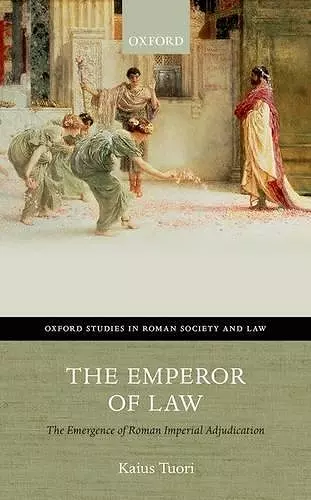The Emperor of Law
The Emergence of Roman Imperial Adjudication
Format:Hardback
Publisher:Oxford University Press
Published:24th Nov '16
Currently unavailable, and unfortunately no date known when it will be back

In the days of the Roman Empire, the emperor was considered not only the ruler of the state, but also its supreme legal authority, fulfilling the multiple roles of supreme court, legislator, and administrator. The Emperor of Law explores how the emperor came to assume the mantle of a judge, beginning with Augustus, the first emperor, and spanning the years leading up to Caracalla and the Severan dynasty. While earlier studies have attempted to explain this change either through legislation or behaviour, this volume undertakes a novel analysis of the gradual expansion and elaboration of the emperor's adjudication and jurisdiction: by analysing the process through historical narratives, it argues that the emergence of imperial adjudication was a discourse that involved not only the emperors, but also petitioners who sought their rulings, lawyers who aided them, the senatorial elite, and the Roman historians and commentators who described it. Stories of emperors settling lawsuits and demonstrating their power through law, including those depicting 'mad' emperors engaging in violent repressions, played an important part in creating a shared conviction that the emperor was indeed the supreme judge alongside the empirical shift in the legal and political dynamic. Imperial adjudication reflected equally the growth of imperial power during the Principate and the centrality of the emperor in public life, and constitutional legitimation was thus created through the examples of previous actions - examples that historical authors did much to shape. Aimed at readers of classics, Roman law, and ancient history, The Emperor of Law offers a fundamental reinterpretation of the much debated problem of the advent of imperial supremacy in law that illuminates the importance of narrative studies to the field of legal history.
This volume is absolutely worth of reading and taking as a permanent cornerstone of the history of the Roman imperial legal praxis. * Outi Sihvonen, Tampere University, Arctos – Acta Philologica Fennica *
this is an impressive and important work ... There is much to praise here ... This is a work that asks more questions than it answers, but that is no bad thing. It challenges the reader, with great subtlety, to rethink the role of the emperor, to look again at what we think we know, and to recognise the artificial remembering of later Roman historiography. We accept Roman imperial adjudication because the Romans did, and if Tuori's argument holds, that is the most important thing about it. * Anthony Smart, Edinburgh Law Review *
The author has indeed produced a work of judgment and sense, one that all students of the imperial legal system will find helpful. * B.M. Levick, American Historical Review *
ISBN: 9780198744450
Dimensions: 222mm x 145mm x 32mm
Weight: 698g
498 pages